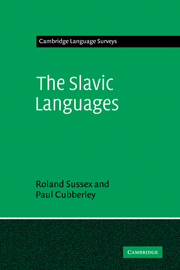Book contents
- Frontmatter
- Contents
- Preface
- Acknowledgments
- map
- 0 Introduction
- 1 Linguistic evolution, genetic affiliation and classification
- 2 Socio-historical evolution
- 3 Phonology
- 4 Morphophonology
- 5 Morphology: inflexion
- 6 Syntactic categories and morphosyntax
- 7 Sentence structure
- 8 Word formation
- 9 Lexis
- 10 Dialects
- 11 Sociolinguistic issues
- Appendix A: Abbreviations
- Appendix B: Orthography and transliteration
- Appendix C: Slavic linguistics: resources
- Bibliography
- Index
Preface
Published online by Cambridge University Press: 22 September 2009
- Frontmatter
- Contents
- Preface
- Acknowledgments
- map
- 0 Introduction
- 1 Linguistic evolution, genetic affiliation and classification
- 2 Socio-historical evolution
- 3 Phonology
- 4 Morphophonology
- 5 Morphology: inflexion
- 6 Syntactic categories and morphosyntax
- 7 Sentence structure
- 8 Word formation
- 9 Lexis
- 10 Dialects
- 11 Sociolinguistic issues
- Appendix A: Abbreviations
- Appendix B: Orthography and transliteration
- Appendix C: Slavic linguistics: resources
- Bibliography
- Index
Summary
Like Rebecca Posner, whose The Romance languages in this series was published in 1996, we have often been daunted by the size and complexity of the task. Slavic is not only a large group of languages but it is also the most written-about (see the Introduction).
Over the last decade Slavic has also been arguably the most externally unstable of the Indo-European language families. The fall of Euro-Communism was marked most dramatically by the tearing down of the Berlin Wall in 1989 and the subsequent dissolution of the USSR, the Warsaw Pact, COMECON and the structures and infrastructures of what US President Ronald Reagan called the “evil empire”. What emerged from the political rebirth of the Slavic lands has turned out to be a linguistic landscape where some stable and persisting features have found themselves side-by-side with a dynamic, unstable and volatile cultural context. The Slavic languages are living in more than just interesting times. It has been our task to try and seize them in motion. We have spent most of our academic lives working in these languages, and this book is partly by way of thanks to the stimulus that working in and on Slavic has given us, and to our colleagues in Slavic around the world who have contributed to the discipline.
A book like this has a dual audience.
- Type
- Chapter
- Information
- The Slavic Languages , pp. xvii - xviiiPublisher: Cambridge University PressPrint publication year: 2006

